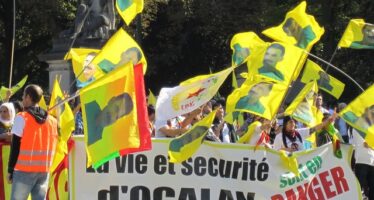The idea of ‘empire and peace’
![]()
NURAY MERT
It has long been claimed that the biggest obstacle in front of the Kurdish issue is the so-called “Serves complex.” Turks were assumed not to have recovered from the memory of the dissolution of the Ottoman Empire. Moreover, Turks thought their sensitivity concerning “national unity” should be pardoned. In fact, it was necessary to overcome such historical complexes in order to consider the idea of more Kurdish rights and some sort of autonomy. Nevertheless, the politics of liberalism did not work in this respect.
Finally, peace with Kurds took a different road: If it was the fear of dissolution of the republic as a result of Kurdish separatism that hindered a solution of the Kurdish issue, then the road to peace could be established in the opposite direction. If Turkey could end up getting smaller because of Kurdish separatism, then the bright idea would be a new type of alliance with Kurds in order to make a “greater” Turkey. The government is now trying to sell this bright idea to overcome the negative reactions in the public concerning the new peace process, in particular the talks with the Kurdistan Workers’ Party (PKK) jailed leader Abdullah Öcalan. In fact, it is a very clever idea to transform the mindset of the conservative nationalists (who do not only constitute the power base of the ruling Justice and Development Party, or AKP, but also the majority of Turkish society). Besides, it is a positive move for realizing a radical and difficult change that we all need to end the conflict.
The only problem is that whenever and wherever politics are based on great plans in modern times, like “the idea of Empire,” the results have been human disaster. Modern history proves that great expectations end up either with some sort of war, since greatness cannot be achieved through peaceful politics alone, or they end up leading to great frustrations, which enforce more conflicts.
The politics of peace, which is based on the idea of equality, dignity and freedom, are radically different from the politics of peace based on the idea of power. The latter is defined by cooperative ambition and the search for greatness at expense of “others,” be they regional rivals or rival ideologies. It results in the rise of the politics of authority at the expense of freedoms, and the rise of politics of war and competition at the expense of peaceful coexistence. If the conflict between Kurds and Turks only ends in the projection of the conflict on others, be they regional rivals or rival ideologies, then peace will remain far away. Such a prospect is very disappointing for those of us who aspire to peaceful politics and democracy in general.
Moreover, the idea of a peace based on great aspirations like “achieving regional leadership,” “reviving the idea of the Ottoman Empire in different forms,” or “making Turkey bigger with a Kurdish alliance,” are very likely to disappoint the inventors of this strategy of peace. First of all, the last thing that the Middle East needs is “great plans” of any kind. Kurds may become sick and tired of being the minors in great plans that basically favor Turkish power, and may end up finding terms like “Turcosphere” quite repulsive at some point. Finally, if the great expectations fail to be achieved, then both parties may end up in further enmity toward each other. I really hope that this is not the case in the peace process’ last big chance.
Related Articles
BDP delegation returns to Hewler
![]()
Hewler/Erbil A delegation of the Peace and Democracy Party (BDP) has returned to Hewler on Saturday after the visit they
Kurdish activists called off hunger strike following Öcalan’s message
![]()
Thousands of prisoners and activists around the world were on hunger strike demanding the end of the isolation against Abdullah Öcalan
Turkish drones killed three women in Kobanê
![]()
On 23 June, three activists of the women’s movement in north-east Syria were killed as a result of a drone attack carried out by Turkey in the village of Helincê (Halinja) near Kobanê



